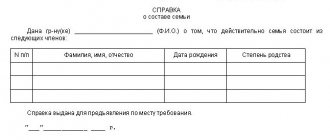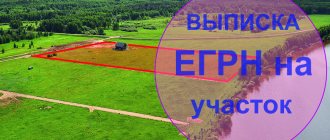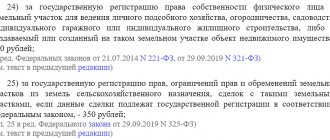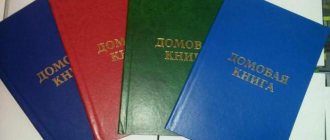Many families want to get the treasured piece of land. In our country, which has undeveloped spaces, land was given out for various reasons, often free of charge upon request or in connection with the formation of a new family. It is advisable for each of us to ask the older generation about the possible availability of unused land.
It is likely that the grandfathers forgot about some plot, and it will be possible to draw up the documents and become a happy landowner without spending money. Now the state has simplified all land procedures so much that it is better to take advantage of it while you have the opportunity.
It is important to know:
- If you received a land plot before privatization on the basis of acts, letters from heads of settlements about the transfer of land, then this article is for you.
- If you were provided with a plot of land with a certificate in the prescribed form, then you can rest easy, you are the owner.
Fortunately, the legislator now allows all those who consider themselves landowners and heirs to register land in their name in a simplified form. In this case, you will need an extract from the household ledger.
What is an extract from a household ledger?
It should be noted that now property registration occurs in a simplified manner for persons who received land plots for use as subsidiary plots, for individual construction, before the advent of the new land law in 2001.
A plot of land for personal farming was issued more often in villages, it is large in size, allows you to plant a vegetable garden and build any buildings, but for individual housing construction it was issued in modern times, usually in the suburbs, it requires compliance with certain rules for building a house, and does not allow for full-fledged gardening.
To become an owner, it is enough to have any of the following documents:
- An order for the allocation of a site, signed by the head of the settlement.
- Property deed obtained from the village administration.
- Extract from the rural household register.
- Another type of information indicating that you have been allocated land, for example, minutes of collective farm meetings, decisions of state farm administration, letters from executive committees on land allocation.
Most often, an extract may be required, even if there are primary documents on the transfer of property, as an additional one.
Since 2010, the requirement of officials to provide a cadastral passport has been considered illegal, since it is optional when registering property rights.
Please note what type of right is listed in the initial certificates:
- own;
- lifelong ownership;
- permanent use for an indefinite period.
Receipt of a legal certificate terminates previously granted rights and you will be deemed to have title to the property.
Household books have been kept from 1934 to the present day. They are an old way of recording the rural population, property, residential buildings, and plots. In conditions of an established procedure for registering property rights, household books are only an additional element of control.
What is it for?
Information from the household ledger is extremely important and is requested in the following situations:
- Privatization of your own plot.
- Transfer of land by inheritance.
- Buying a new allotment.
- Clarification of boundaries.
- Providing information to the cadastre.
It should be noted that until March 2021, permission to put into operation is temporarily not required by the state; information about the ownership of the site is sufficient for registration.
A significant relief for landowners was the acceptance of information from household books in cadastral chambers. The information received is accepted for cadastral registration. Thus, interested parties supplement the databases of regulatory authorities with missing information.
It must be taken into account that the state, by simplifying the solution of land issues, has two main interests:
- Assigning property to the immediate owners to improve the quality of use.
- Replenishment of the budget through land tax revenues.
Features of obtaining information about a residential building
The legislation establishes that every owner has the right to obtain all the information from the household register about his home.
An extract for a residential building is drawn up in free form or according to the established template, which is offered by the Ministry of Agriculture.
The extract is made in 2 copies . One of them remains stored in an administrative institution.
The acts are certified by the seal and signature of the person responsible for business accounting. The document is provided against the signature of the applicant upon showing the passport.
To purchase an extract, you must provide the following documents :
- applicant's passport;
- an act confirming the powers of the trustee if a representative is acting;
- title documentation for the plot (these papers are not asked if the ownership is registered in the Unified State Register of Real Estate);
- cadastral documents for the house.
Regulations
For convenience and control of work with the population in terms of providing services for issuing data from the household ledger, local government bodies formulate regulations.
Most often, these standards include information of the following nature:
- Method for requesting an extract. This may be a request via the Internet, email, or a written statement.
- Names and positions of responsible persons. The numbers of offices, telephones, and working hours of specialists are indicated.
- List of requested information. The form of certification and the number of copies are indicated here.
- List of grounds for refusal to provide a certificate.
- Submission deadlines. They are set by the authorities themselves depending on their workload.
Storage rules
This document, frankly speaking, not so significant at first glance, belongs to the category of “special significance”. The household ledger should be kept exclusively in a fireproof safe, where important documents and accounting records are stored.
The storage process, by the way, includes the following features :
- The document must be located in the administration of a specific locality (village - in the village council, city - in the mayor's office);
- The person responsible for safety is the head of local government. By being negligent in “this” matter and allowing records to be damaged, the person responsible may be subject to criminal liability;
- The shelf life in the local administration is 75 years. After this period, the book is transferred for indefinite storage to the regional archive.
Who is eligible to receive
In general, a request for an extract can be made by:
- citizens on personal matters;
- representatives of organizations;
- government authorities to confirm the facts of land use.
Important innovations: currently, an extract about the previous owner can be obtained by the current owner or a person claiming ownership of the property.
Representatives of legal entities can also make a request by presenting a power of attorney.
When citizens apply, interested parties include notaries, employees of registration chambers, and lawyers specializing in inheritance matters.
Procedure
Based on the current legislation, the following procedure :
- The data is filled out by an employee of the local administration (on whose territory the settlement is located);
- The above-mentioned employee personally conducts a tour of the entire private sector once every five years in order to conduct an agricultural inventory;
- In addition to such a “walk-through” once every five years, the villagers themselves, as stated, must annually report on the replenishment of their farms or the expansion of household ownership;
- Only after all data has been approved and the information received has been processed, it is entered directly into the book, recorded by all government agencies and can be used (processing period: about a month).
It is impossible not to note a number of additional points that, according to the rules, must be disclosed:
- Last name, first name and patronymic of the owners of the farm, as well as persons who have the legal right to the listed property;
- The document must contain information about the persons who took the “farm” under a lease agreement (this could be a plot of land, a house, a building);
Where to receive
You can request a certificate from the household register from the nearest authorities in the area where the land plot is located.
It can be:
- rural administrations;
- village authorities;
- land property management committees;
- multifunctional centers;
- other structures.
Now the extract is provided in a new unified form from 2012 and contains the following mandatory details:
- Information about the owner, his address.
- Primary information that serves as the basis for inclusion in the book.
- Category of allotment, area, location address.
- Type of right to property.
- Last name, position of the person, name of the organization that issued the certificate.
What information does it contain?
What can you learn from such a book?
Household books are not compiled for each household separately. They represent a single document about all farms in a certain village or other area.
When recording all private household plots located in a certain area, a separate record (personal account) is created for each of them.
They contain the following information:
- personal account number and farm address;
- information about all its members;
- area of land occupied by plantings and crops;
- its cadastral number;
- about the rights to the existing plot;
- on the number and composition of bred animals, birds, bees;
- about available agricultural equipment and machinery.
According to the established procedure, one of the members of the household is recorded in the book first. In fact, he is recognized as the head of the specified farm. For all other persons, not only personal data is indicated, but also the relationship to the person recorded first.
What is needed to receive
The request can be sent electronically or by registered mail.
According to the regulations, each government agency working with the population informs about the procedure for providing information. This information is usually posted on stands, the organization’s website, and transmitted by telephone.
Typically, several steps must be taken to obtain a certificate:
- Fill out an application for the release of information.
- Submit copies of the required documents according to the list. These are letters, acts, instructions, orders, resolutions. You need to find out in advance about the form of certification; you may need notarized copies.
- To register an inheritance, you will need copies of birth, marriage, relationship, death certificates of the previous owner, and a will.
- Present the originals for review, including your passport.
- If you are acting on behalf of an interested party, bring a power of attorney.
- Take the second copy of the application with a stamp of acceptance by the responsible person.
Information contained
The document in question should currently contain the following information :
- Availability of cattle, birds and other living creatures by a citizen (villager, private entrepreneur, farmer);
- Does the citizen (his family members) have land plots for personal agricultural work;
- Availability of an apiary (the number of hives is indicated);
- Does the villager own buildings (except for a residential building): farms, barns, other buildings;
- Does the citizen own any equipment (here it is necessary to indicate both the presence of conventional vehicles and agricultural equipment: tractor, combine).
As for why it is necessary and why it is so important in modern society, we can highlight the following reasons:
- According to the data indicated in the household book, your animals are automatically registered at the nearest veterinary clinic at the village council or in the regional center, which ensures timely checks of your animals for the presence of life-threatening diseases;
- During legal difficulties and proceedings, in which one or another person wants to seize part of your property, including some part of the livestock, the court will definitely require the parties (parties) to provide the document in question.
Price
The state provides the service of issuing certificates free of charge. The state fee will be charged only when submitting an extract for registration of rights.
Due to the fact that the issue of issuing such information is left to the discretion of local authorities, the time frame for receiving the document is also set differently, but cannot be more than 30 calendar days.
If you have any disagreements with the authorities, you will have to resolve the issue by going to court.
Please note that all landowners are required to pay land tax.
Norms
Anyone can analyze the topics covered in the article; for this you can use the following information:
- Land Code of October 25, 2001 No. 136-FZ, as amended on July 13, 2015.
- Law “On state registration of rights to real estate and transactions with it” dated June 17, 1997 No. 122-FZ, as amended on July 13, 2015.
- Law “On personal subsidiary farming” dated July 7, 2003 No. 112-FZ, as amended on June 21, 2011.
- Resolution of the Council of People's Commissars of the USSR No. 185 of January 26, 1934 on the introduction of a household register.
- Order of the Federal Service for State Registration, Cadastre and Cartography dated 03/07/2012 No. P/103 on the introduction of a new form of extract from the household register.











